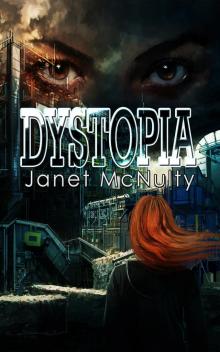- Home
- Janet McNulty
Dystopia Page 3
Dystopia Read online
Page 3
When the street lights had gone out, Dana threw off the covers and slipped on her shoes. She opened the door to her room a crack, making certain that her parents were asleep. Her father’s snore told her they were. Quickly, Dana opened her window and removed the screen. She crawled outside, hiding behind the bush that was there.
Glancing down the street, Dana dashed to the other side and down an alleyway. She kept to the shadows to avoid detection. Officers patrolled the streets at night. Anyone caught out past curfew was subject to prosecution. Mostly, they just disappeared and were never heard from again.
Dana did not care about the consequences. She wanted a place to think and knew just where to go.
She found the wall that marked the city limits. The area beyond was out of bounds, and none were supposed to venture there. Dana ran her hand against the concrete wall, looking for the place where a part of it had crumbled away. Found it. Carefully, she removed the loose bricks, revealing a hole just big enough to crawl through.
Once through, Dana waited for the guard tower spotlight to turn away. She ran off into the night, far away from her city and to the great beyond. Once she knew she was safely away, Dana slowed to a walk until she found the trail that her grandfather had once shown her. Following it, Dana knew where it would take her.
At last, she reached a small clearing that overlooked a valley and the city she lived in. Her home seemed so peaceful from where she stood. Dana sat on the soft grass and picked at the flowers.
“I don’t want to go,” she said to the night sky.
“Then don’t,” her grandfather’s voice said in her mind.
Oftentimes, Dana imagined that he still answered her, even though he was dead. Years ago, when she was a small child, they came to the same clearing. He would take her and Lina in the middle of the night, and together, they snuck outside the city. Dana fiddled with her hair as she remembered how he would put it into two braids, calling her his “Indian Princess”. Then, he would give her some strawberries that he had somehow managed to procure. She had loved those moments when they just sat together alone without the fear of being caught.
Sadness overtook her as she remembered the day her grandfather had left. He had fallen and broken his hip. The Board of Health had decided that it wasn’t worth the cost of fixing it. He had become too old, a waste of resources. Soon afterward, he received a notice informing him to report to Wing 16 of the hospital. Everyone dreaded such a letter. All who went to Wing 16 never returned.
The day her family took her grandfather there was seared into her mind. Her mother wept quietly, trying to hide her tears. Though somber, her father managed to hold back his emotions as he held onto Lina. Dana did not understand at the time. She only knew that she would never see her beloved grandfather again.
“Don’t cry for me,” her grandfather had told her as he hugged her. “You must be brave, my little Indian Princess.”
“I don’t know how,” Dana had cried.
“You have a greatness about you. You will change things.” He kissed her and disappeared behind the steel doors of Wing 16.
Dana wiped a tear from her eye as she thought back to that time. Briefly, she considered running away. But where will I go? She shook her head. Dana knew she could not flee; her parents would suffer if she did.
The clock tower in the city tolled, telling her that she had lingered too long. Hastily, Dana left. She made her way back to the hole in the wall and slipped through. After replacing the bricks, she looked about for officers. Finding it clear, Dana went back home, slipped through her window, and went to bed. Tomorrow, her new life began.
Morning dawned and Dana found herself waiting at the bus depot with her parents. A somber mood overwhelmed them. They waited patiently for the bus to arrive that would take her to Waste Management.
Car ownership was illegal; it was considered bad for the environment, and the plant lay too far away for her to walk. Dana thought it odd that those within the government were allowed to own vehicles.
A horn sounded as the bus pulled up. Black smog erupted from the back end of the dingy bus. You’d think they could make a bus that didn’t produce so much smoke, thought Dana.
Her mother’s light touch forced her to turn around.
“It’s alright, mom,” said Dana in an effort to comfort her mother. “In two years, I’ll apply for reassignment. I might even get it.”
Her mother forced a weak smile. “Here,” she wrapped a jacket around Dana’s shoulders. “They always leave the windows open on that bus and it gets drafty. And take this.” Her mother placed the strap of a bag on Dana’s shoulders. “A little something for the road.” Dana hugged her.
“You take care of yourself,” her father said as he hugged her.
“I will, dad. Take care of yourselves too.”
A tear welled up in his eyes. “My darling girl.”
The sharp, impatient honk of the horn forced them to part. Dana climbed onto the bus and sat in a window seat toward the back. She waved one last time as the bus pulled away.
Dana peeked into the bag that her mother had given her. She found a thermos of milk and a small bag of cookies. Cookies were contraband items. Dana’s heart ached as she realized that her mother risked everything to give her their weekly ration of milk and a forbidden treat.
The bus plowed through the city as it headed for the Waste Management plant, making stops along the way to pick up more unlucky graduates. Dana stared out the window as she munched her cookies. No one bothered to look in her direction.
They passed the Ministry Building, where a long line of new employees awaited initiation. Dana spotted Kenny. He wore a crisp suit that cost more than what most earned in a month. Jealousy filled her. At that moment, she found herself hating Kenny and his family, just because his father was the First Councilman and an influential man on the Careers Board because of his position, the very board that dealt out career assignments. As Dana thought about it, she realized that the kids whose parents ran the various bureaucratic agencies always got the most desirable positions.
She settled back into her uncomfortable seat as the bus continued. By midafternoon, they pulled into the Potomac Sector where the Waste Management plant was. Dana studied the old ruins of white buildings. Remnants of the old ways, a time when people failed to realize the equality of fairness.
Smoke filled the area, making it difficult to breathe. Dana covered her mouth with the sleeve of her jacket. Slowly, the bus pulled into the main part of the plant.
An officer stepped onto the bus the moment the doors opened. “Everyone off,” she yelled. “Now! Move it!”
Instantly, people jumped from their seats and scrambled over each other to get off the bus. Dana found herself pushed and shoved into a line of others who were unlucky like her.
Another officer waited for them to line up. He paced before them in his crisp uniform and shiny black boots with a baton in his hands. “Listen up! My name is Officer Burroughs and I run this establishment. My word is law. Obey it and we will get along fine. Disobey, and suffer the consequences.
“Some of you may think you don’t belong here. I don’t give a damn what you think. You are here now and that is all that matters. This is where all the trash comes. We organize some for recycling, the rest is incinerated.
“You will all be divided into groups where you will sleep and live together in a barracks. You get two meals a day in the cafeteria. You will spend 14 hours a day working. One hour for relaxation. The rest is for sleeping.
“Those who receive permits to live together will be transferred to family housing.”
Officer Burroughs pointed his baton in the direction of a bunch of shacks. Most of those buildings had one or two rooms and no electricity.
“There will be no leaving this place. The boundaries are clearly marked. Anyone who violates them will be dealt with accordingly.
“Welcome to Waste Management.” He smiled sardonically.
Immediately, officers parceled everyone int
o groups. Dana soon found herself stripped of her belongings. She was glad she had eaten her mother’s cookies on the bus. Soon, she was led naked through the plant, with others, to the showers. Men and women were shoved in the same showers in groups. They had 10 minutes to wash. Once finished, they were forced through a lice inspection before being given their work clothes, which consisted of a gray shirt, coveralls, and heavy boots.
Dana looked at a group of pregnant women who picked through the recycling pile as she marched to her barracks. After a quick tour of the plant, each received their work schedule.
“Deviation from the schedules is not allowed,” said the officer that handed them out.
Dana studied hers, noting that she had to be at the incinerator at six in the morning. She plopped it and her blanket and pillow on a bunk.
“That’s my bunk,” said a voice behind her.
Dana turned and found a black kid of about her age, holding a blanket and pillow. She grabbed her stuff and moved to a different bunk, not wanting a fight.
“Hey, baby,” said the kid, “I’m sure we can work something out.” His eyes roamed up and down her slender form.
“I don’t think so.”
“Hey, no one turns their back on me. Now, baby, you may be brown skinned, but I could make an exception for you. See my boys back there. We could protect you if you were to be my girl.”
“I’ll pass,” said Dana.
“Hey,” the kid grabbed her wrist tightly, pulling her toward him.
Infuriated at being treated in such a way, she grabbed the back of his head and forced it into the bed post.
“You bitch!” The boy held his bloody nose. “I’ll—”
“Is there a problem here?” A couple of officers had arrived, each waving their electric batons.
“Naw, man,” said the kid, still holding his nose.
“Take your bunks,” said the officer.
Dana snatched her stuff and moved to a bunk on the other end of the room.
“Hey, you bunk with us,” said a dark-skinned girl with braids. A scrawny guy with glasses sat next to her.
Dana put her stuff on a nearby bunk.
“I’m Elsie,” said the girl. “And this is Sanders. A total brainiac by the way.”
“Dana.”
“So, making enemies with Mad Dog over there? Way to go, genius.”
“Mad Dog?” asked Dana.
“No one knows his real name. He’s from the South like Sanders and I here. Same neighborhood actually.”
“I can see why he was sent here.”
“Hey, troublemakers are always sent here,” said Elsie. “I got one too many citations and Sanders here, that’s a laugh.”
“Did you know that you can take a chip and use it to power a light bulb? In fact—”
“She gets the point, Sanders,” said Elsie.
“If you’re really good with technology, shouldn’t you have been assigned to the Science and Technological Research Division?” Dana asked.
“He was,” said Elsie, “but they kicked him out.”
“Why?”
“I told them they still practiced the primitive stone age of computers. His figures were based on outdated logarithms of—”
“The point is,” interrupted Elsie, “he questioned the authorities, so they sent him here. What about you?”
“I ask too many questions,” said Dana.
“Whoa! That’ll do it.”
“Lights out!” yelled an officer as everything went dark.
“Will you take the top bunk?” said Sanders. “I’m afraid of heights.”
“It’s as tall as your head,” said Elsie. “Oh, very well.” She climbed into the top bunk while Dana nestled into hers. “See ya in the morning.”
Chapter Four

 Sugar And Spice And Not So Nice
Sugar And Spice And Not So Nice Dystopia
Dystopia Ensnared (Enchained Trilogy Book 2)
Ensnared (Enchained Trilogy Book 2) Double, Double, Nothing But Trouble (A Mellow Summers Paranormal Mystery Book 10)
Double, Double, Nothing But Trouble (A Mellow Summers Paranormal Mystery Book 10) Janet McNulty - Mellow Summers 05 - Oh Holy Ghost
Janet McNulty - Mellow Summers 05 - Oh Holy Ghost Janet McNulty - Mellow Summers 02 - Frogs, Snails, and a Lot of Wails
Janet McNulty - Mellow Summers 02 - Frogs, Snails, and a Lot of Wails Janet McNulty - Mellow Summers 03 - An Apple a Day Keeps Murder Away
Janet McNulty - Mellow Summers 03 - An Apple a Day Keeps Murder Away Janet McNulty - Mellow Summers 08 - Trick Or Treat Or Murder
Janet McNulty - Mellow Summers 08 - Trick Or Treat Or Murder Janet McNulty - Mellow Summers 01 - Sugar And Spice and Not So Nice
Janet McNulty - Mellow Summers 01 - Sugar And Spice and Not So Nice Roses Are Red; He's Dead (A Mellow Summers Paranormal Mystery Book 9)
Roses Are Red; He's Dead (A Mellow Summers Paranormal Mystery Book 9) Janet McNulty - Mellow Summers 07 - Two Ghosts Haunt a Grove
Janet McNulty - Mellow Summers 07 - Two Ghosts Haunt a Grove Janet McNulty - Mellow Summers 04 - Three Little Ghosts
Janet McNulty - Mellow Summers 04 - Three Little Ghosts